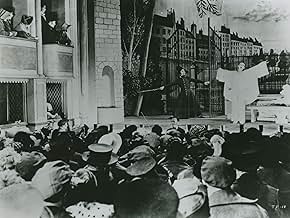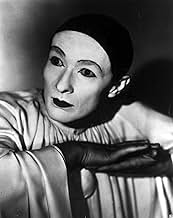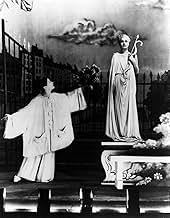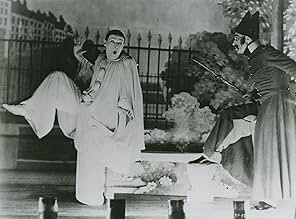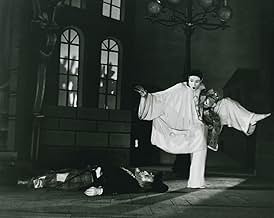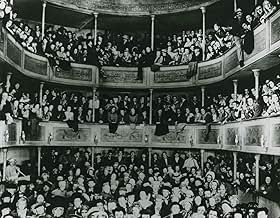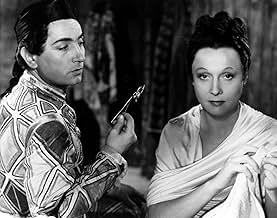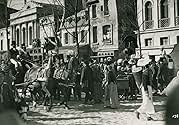VALUTAZIONE IMDb
8,3/10
21.921
LA TUA VALUTAZIONE
La vita teatrale di una bella cortigiana e dei quattro uomini innamorati di lei.La vita teatrale di una bella cortigiana e dei quattro uomini innamorati di lei.La vita teatrale di una bella cortigiana e dei quattro uomini innamorati di lei.
- Regia
- Sceneggiatura
- Star
- Candidato a 1 Oscar
- 2 vittorie e 1 candidatura in totale
María Casares
- Nathalie
- (as Maria Casarès)
Palau
- Le régisseur des Funambules
- (as Pierre Palau)
Etienne Decroux
- Anselme Debureau
- (as Étienne Decroux)
Jane Marken
- Mme Hermine
- (as Jeanne Marken)
Raymond Rognoni
- Le directeur du Grand Théâtre
- (as Rognoni)
Recensioni in evidenza
Les enfants du paradis is the masterpiece of the duet Carré-Prévert. Although I did not enjoy it as much as Renoir' s work, it must be said of course that it is one of the biggest and most ambitious and most elaborate films ever made in France. Technically I was amazed by the huge sets of the beginning representing the city of Paris in the XIX century (le boulevard du Temple) and set in Nice, and the camera movements within the crowd. We have indeed to take into account the awful conditions in which the film was shot: under occupied France and in co-production with an Italian company that retired when Sicily was occupied, in the mid-shooting. (Colin Crisp) Les enfants du paradise is for me a magnificent, huge story; it is for the cinema what Balzac and Victor Hugo were for literature in the XIX century; not only French, but the world's. A colossal masterpiece with a desperately long, elaborate plot and well-defined powerful characters that confront each other trying to find out in their intercourse the answer to metaphysical questions about love and life between fantasy and reality, just as Armes suggests. Les enfants du paradis boasts an entire collection of characters that make up a twisted action as a result of the confrontation of their personal characteristics. Baptiste Deburau, a real-life mime of the XIX century is the main character. As pointed out in class, many Freudian interpretations have been made about this character: he is weak, he is unable to reach his desires (Garance), he does not want to accept the love he already has (the girl who desperately loves him), he is not a hero, but the very opposite: someone who deserves the pity of the spectator; but also that of Garance and that of his public: when he acts as a mime, the character (as usual) is always chased by fatality and sadness. He even wanted to commit sucide! Garance is a simple woman, as she says in the film. She is ambiguous. Some (the Cinemania magazine in Spain, for example) see her as a prostitute (remember the place where she used to work, her flair, or the strange character she was with and who accused her of stealing his watch -a client, a pimp?). Whatever she may be, she is a lonely woman looking for a lonely love. The four main characters of the film are in love with her, but in a different way each. Each one takes her in the way they want her to be -we see her in the arms of Lemaitre or the Count as though she was two different persons-, except for Baptiste, who at the end of the film will realize and chase his true love -although we do not know what happens at the end. Lemaitre is the man, the Don Juan, the witty, attractive and winning beloved artist. He is proud of himself and his public is proud of him. He provides some talented moments of witty puns or funny, twisted scenes -like the one in the theatre. But there are two things that he cannot obtain: absolute art, in his own opinion only Baptiste has the genius; and absolute love, Garance, who she will love but only one night. However, he can manage it all, he is a scrounger and he will still enjoy his life as it comes. Lacenaire is an ominous, dark mixture of Lemaitre and Baptiste. He is proud as Lemaitre but triumph has cheated him -he is completely awkward as a writer. And he is resentful and sad as Baptiste. These two lead him into violence against his love, Garance and against the Count -I really enjoyed the scene of the murder: the close-up and the grimace of Avril- which can also. The murder can also be taken as a rebellion of the resentful lower classes against the upper classes: the image of the fallen, dead hand with the valuable ring is significant. The count is a symbol for the upper classes: childish (his hairstyle, his expression are those of a young boy), whimsical, materialist, stuck-up, posh, he thinks he can achieve the love of Garance thanks to his influences (he saves her from the police) and wealth (notice the rich veil Garance wears at the beginning of L'homme blanc. But he will lose everything by hands of Lacenaire. Finally, I liked the character of the girl who is in love with Baptiste. She really reminds me of Éponine form Les Misérables by Hugo, the unrequited young girl in love with Marius, the main character. She wanders alone through the film, seeking the love of Baptiste, without success. And she plays the lead in one of the most bitter scenes in the film, about which we will talk later.
The main topics in the film are love on one side and life between fantasy and reality on the other. Love is always present in various forms. A passionate love by Lemaitre, a platonic love by Baptiste, an unrequited love by the girl who loves him, a love bought with money, by the Count, a violent love, by Lacenaire. But Carné and Prévert really want to show that only a true, pure and simple love will prevail. That is the love Garance seeks and that only Baptiste will be able to give her at some point. 'Love is so simple' is one of the climax phrases, containing the key of love in the movie will first pronounced by Garance and later by Baptiste. However, there are some other bitter moments on the dark side of love: at the end of the film, when Garance flees and Baptiste chases her, his wife will stand alone, in the middle of the room, still. The camera will stay with her, and we can see her reaction, that of a little child so suddenly and badly struck by betrayal. 'What about me?' So simple words that however struck me. There is in the movie a constant game between life and theatre. This has a lead role throughout both parts of the movie. We can see gorgeous and funny sketches by Baptiste (right at the beginning, when he meets Garance, and later on his performances), and burlesque or sublime representations by Lemaitre. And in general a whole bunch of characters form the theater life will show off in the movie, and theater life itself can be seen in a close-up: the owner of the theater des Funambuls, the three authors (victims of a bitter criticism and humor), the side characters. However, the climax of this close relationship between theater and life arrives in the scene where Lemaitre, who knows he can do whatever he wants on a stage, as he is a superstar, strays from the script and begins fooling around. He goes out to the stalls and then action bends over itself, and does not depend on the authors any longer: the double game actor-spectator, fiction-reality reflexes itself in a witty dance. And Lemaitre leads us in the confusion, what is real and what is not?. And that confusion is so funny for the public; and is also illicit, but Lemaitre is allowed to do anything within a theater. There is another moment where the characters of life (Garance, Lameitre and co.) long for being public again. At the beginning of the second part, Garance tells Lemaitre about the 'children of paradise', that is 'les enfants du paradis'. They are so poor, so happy, so irresponsible, up there in the cheapest seats! Just like children, as the title of the movie says. And Garance misses that, she misses that time of her life when she did not have anything to do with the Count or with the rich veil that covers her face. And the drawing from the cover of the film is meaningful too: the children of paradise sitting and watching the rest of characters, as if they were real characters in a play. And all the characters are just watching the center around which all action spins: their either beloved or hated Garance.
The main topics in the film are love on one side and life between fantasy and reality on the other. Love is always present in various forms. A passionate love by Lemaitre, a platonic love by Baptiste, an unrequited love by the girl who loves him, a love bought with money, by the Count, a violent love, by Lacenaire. But Carné and Prévert really want to show that only a true, pure and simple love will prevail. That is the love Garance seeks and that only Baptiste will be able to give her at some point. 'Love is so simple' is one of the climax phrases, containing the key of love in the movie will first pronounced by Garance and later by Baptiste. However, there are some other bitter moments on the dark side of love: at the end of the film, when Garance flees and Baptiste chases her, his wife will stand alone, in the middle of the room, still. The camera will stay with her, and we can see her reaction, that of a little child so suddenly and badly struck by betrayal. 'What about me?' So simple words that however struck me. There is in the movie a constant game between life and theatre. This has a lead role throughout both parts of the movie. We can see gorgeous and funny sketches by Baptiste (right at the beginning, when he meets Garance, and later on his performances), and burlesque or sublime representations by Lemaitre. And in general a whole bunch of characters form the theater life will show off in the movie, and theater life itself can be seen in a close-up: the owner of the theater des Funambuls, the three authors (victims of a bitter criticism and humor), the side characters. However, the climax of this close relationship between theater and life arrives in the scene where Lemaitre, who knows he can do whatever he wants on a stage, as he is a superstar, strays from the script and begins fooling around. He goes out to the stalls and then action bends over itself, and does not depend on the authors any longer: the double game actor-spectator, fiction-reality reflexes itself in a witty dance. And Lemaitre leads us in the confusion, what is real and what is not?. And that confusion is so funny for the public; and is also illicit, but Lemaitre is allowed to do anything within a theater. There is another moment where the characters of life (Garance, Lameitre and co.) long for being public again. At the beginning of the second part, Garance tells Lemaitre about the 'children of paradise', that is 'les enfants du paradis'. They are so poor, so happy, so irresponsible, up there in the cheapest seats! Just like children, as the title of the movie says. And Garance misses that, she misses that time of her life when she did not have anything to do with the Count or with the rich veil that covers her face. And the drawing from the cover of the film is meaningful too: the children of paradise sitting and watching the rest of characters, as if they were real characters in a play. And all the characters are just watching the center around which all action spins: their either beloved or hated Garance.
10geroldf
*Enfants* is a work of genius. I won't say it's the greatest film of all time, because its scope is very narrow: the mystery of the heart, the wayward course of love, the bittersweet joy and sorrow of lovers. Maybe that isn't so narrow after all, but it doesn't cover quite as wide a spectrum as other great films (seven samurai, casablanca, mahabharata, key largo etc). Nonetheless, this film belongs in that same company, for an unsurpassed portrayal of loves lost and won, and also the passion of art, a form of love expressing itself in public creativity, enriching the lives of many. Love between lovers enriches them alone; art enriches the world.
The woman Garance is loved by 4 men in this film. Two of them, at least, are superb renditions of genius-in-creation: the mime Baptiste, and the actor Frederick. Both are geniuses, but while Baptiste is silent, weak, and sad, Frederick is loud, powerful, irrepressively optimistic, courageous and generous. He is one of the greatest characters ever to grace the screen. He has one flaw: his genius is so pure, he has a blind spot regarding the weaknesses of others. He cannot conceive of an emotion such as jealousy, and so can never play Iago - until Garance, the fallen woman, finally teaches him.
The other character who may be a genius is Lacenaire, but he is a criminal genius. Evil, twisted, burning with hatred, he has only one true and honest anchor in society - his love for Garance. It doesn't save him, but it keeps him from being as bad as he could be.
Without going into the whole plot (it's long and convoluted) the primary paradox relates to intersecting and disconnected paths of love between the characters. Garance is loved by 4 men, but she really only loves Baptiste. So does Nathalie, a sweet and simple girl, who has the courage to do what Baptiste can not: she declares her love, and so they marry and have a child. Baptiste lacks the strength to take Garance when he has the chance, and so no one is happy - except maybe Frederick, he lives as life should be lived, and even the pain of losing Garance turns to gold in the alchemy of his art.
But despite the pain, and the unhappiness, loss and death, the world of *enfants* is beautiful. It's a world where love and art mean more than success or failure, a world where money is irrelevant and the passion for life burns away the curtain between fantasy and reality. It's three hours of *paradis*!
10/10, with a bullet through the heart.
The woman Garance is loved by 4 men in this film. Two of them, at least, are superb renditions of genius-in-creation: the mime Baptiste, and the actor Frederick. Both are geniuses, but while Baptiste is silent, weak, and sad, Frederick is loud, powerful, irrepressively optimistic, courageous and generous. He is one of the greatest characters ever to grace the screen. He has one flaw: his genius is so pure, he has a blind spot regarding the weaknesses of others. He cannot conceive of an emotion such as jealousy, and so can never play Iago - until Garance, the fallen woman, finally teaches him.
The other character who may be a genius is Lacenaire, but he is a criminal genius. Evil, twisted, burning with hatred, he has only one true and honest anchor in society - his love for Garance. It doesn't save him, but it keeps him from being as bad as he could be.
Without going into the whole plot (it's long and convoluted) the primary paradox relates to intersecting and disconnected paths of love between the characters. Garance is loved by 4 men, but she really only loves Baptiste. So does Nathalie, a sweet and simple girl, who has the courage to do what Baptiste can not: she declares her love, and so they marry and have a child. Baptiste lacks the strength to take Garance when he has the chance, and so no one is happy - except maybe Frederick, he lives as life should be lived, and even the pain of losing Garance turns to gold in the alchemy of his art.
But despite the pain, and the unhappiness, loss and death, the world of *enfants* is beautiful. It's a world where love and art mean more than success or failure, a world where money is irrelevant and the passion for life burns away the curtain between fantasy and reality. It's three hours of *paradis*!
10/10, with a bullet through the heart.
One day in 1966 I was walking along 8th Street in the Village. The Village was where I went when I had no where else to go, when I belonged no where, where I thought I could discover myself. It didn't hurt that there were people to stare at, without being too obvious about it.
It was a gray day and it started to rain. I stopped under the first protection I found, a movie marque - neither handsome nor attractive.
The photos promoting the film were behind glass at odd angles, held by tacks. I just wasn't in the mood. It wasn't what I was looking for. But the rain got worse, and I needed warmth. So I bought my ticket to join the twenty or so people who comprised the full audience.
From its first moment, the film pulled me in. After a frenetic start, it quieted to Jean-Louis Barrault sitting alone on a barrel. I'd seen Marceau before, but not until now had I seen the quiet poetry of true mime.
Barrault's character, Baptiste, had silently observed the theft of a watch. Baptiste pantomimed the theft but staged his pantomime as if people's perceptions were a mistake, as if the theft never took place. In the doing, he made everyone laugh. He did this for the love of Garance, played by Arletty, whom he had seen for the first time.
There follows in the film first love - unrequited, poetic, soulful. We see villainy, melodrama, danger, heroism, satire, plays within plays - a host of stories all integral to the whole of the play. And we believe completely.
It is the most complete film ever made. It changed my life.
It was a gray day and it started to rain. I stopped under the first protection I found, a movie marque - neither handsome nor attractive.
The photos promoting the film were behind glass at odd angles, held by tacks. I just wasn't in the mood. It wasn't what I was looking for. But the rain got worse, and I needed warmth. So I bought my ticket to join the twenty or so people who comprised the full audience.
From its first moment, the film pulled me in. After a frenetic start, it quieted to Jean-Louis Barrault sitting alone on a barrel. I'd seen Marceau before, but not until now had I seen the quiet poetry of true mime.
Barrault's character, Baptiste, had silently observed the theft of a watch. Baptiste pantomimed the theft but staged his pantomime as if people's perceptions were a mistake, as if the theft never took place. In the doing, he made everyone laugh. He did this for the love of Garance, played by Arletty, whom he had seen for the first time.
There follows in the film first love - unrequited, poetic, soulful. We see villainy, melodrama, danger, heroism, satire, plays within plays - a host of stories all integral to the whole of the play. And we believe completely.
It is the most complete film ever made. It changed my life.
it takes a real poet to write dialog this incisive, not that i speak french, but the new subtitles are very clear (visually) and concise (linguistically)... the poet was jacques prevert, the director marcel carne, and if you want to know how powerful real moviemaking can be, you have to see this picture... as in all true tragedy, the various pairs of lovers comment by their actions on each other's destinies... baptiste/garance are the main pair we care most about, but all the others contribute to and contrast with their true, genuine, doomed affair... the shadows of the main pair are baptiste/nathalie, and garance/frederick, descending to the sick depths of garance/edouard, lacenaire/avril, and jericho/himself. it's like a deck of cards with all possible combinations revealed. based on a true story, set against the theatre milieu of the 1840s, this has the world's best crowd scenes, partially because carne employed every actor in france who needed saving from the nazis, including hiding jews on the set (it was made during WWII). the use of mime advances the plot and is not simply an excuse for baptiste to show off his real-life talents (jean-louis barrault conducts a school of mime in france to this day.) the stunningly vibrant arletty plays garance, a whore with a heart, as if such a thing had never happened before... and until she did it her way, it hadn't...
CHILDREN OF PARADISE has a history almost as remarkable as the film itself. Production was just beginning when Paris fell to the Nazis; the work was subsequently filmed piecemeal over a period of several years, much of it during the height of World War II. And yet astonishingly, this elaborate portrait of 19th Century French theatre and the people who swirl through it shows little evidence of the obvious challenges faced by director Marcel Carne, his cast, and his production staff. CHILDREN OF PARADISE seems to have been created inside a blessed bubble of imagination, protected from outside forces by the sheer power of its own being.
The story is at once simple and extremely complex. A mime named Baptiste (Jean-Louis Barrault) falls in love with a street woman known as Garance (Arletty)--and through a series of coincidences and his own love for her finds the inspiration to become one of the most beloved stage artists of his era. But when shyness causes him to avoid consummation of the romance, Baptiste loses Garance to her own circle of admirers--a circle that includes a vicious member of the Paris underworld (Marcel Herrand), rising young actor (Pierre Brasseur), and an egotistical and jealous aristocrat (Louis Salou.) With the passage of time, Garance recognizes that she loves Baptiste as deeply as he does her... but now they must choose between each other and the separate lives they have created for themselves.
While the film is sometimes described as dreamy in tone, it would be more appropriately described as dreamy in tone but extremely earthy in content. Instead of giving us a glamorous portrait of life in theatre, it presents 19th Century theatre as it actually was: dominated by noisy audiences perfectly capable of riot, the actors usually poor and hungry and mixing freely with criminal elements, the desperate struggle to rise above the chaos to create something magical on stage. And while the film is not sexually explicit by any stretch of the imagination, by 1940s standards CHILDREN OF PARADISE was amazingly frank in its portrayal of Garance's often casual liaisons; American cinema would not achieve anything similar for another twenty years.
Everything about the film seems to swirl in a riot of people, costumes, and overlapping relationships, a sort of mad confusion of life lived in a very elemental manner. And the cast carries the director's vision to perfection. Jean-Louis Barrault is both a brilliant actor and brilliant mime, perfectly capturing the strange innocence his role requires; the famous Arletty offers a divine mixture of exhaustion, sensuality, and self-awareness that makes Garance and her fatal attraction uniquely believable. And these performances do not stand in isolation: there is not a false note in the entire cast, the roles of which cover virtually every level of society imaginable.
With its complex story, vivid performances, and stunning set pieces, the film has a longer running time than one might expect, and some may feel it is slow; I myself, however, did not read it as slow so much as precise. It takes the time to allow the characters and their various stories to develop fully in the viewer's mind. I must also note that while a knowledge of theatre history isn't required to fall under the spell of this truly fascinating film, those who do have that background will find it particularly appealing. CHILDREN OF PARADISE is one of the few films that can be viewed repeatedly, one of the truly great masterpieces of cinema. Strongly, strongly recommended.
Gary F. Taylor, aka GFT, Amazon Reviewer
The story is at once simple and extremely complex. A mime named Baptiste (Jean-Louis Barrault) falls in love with a street woman known as Garance (Arletty)--and through a series of coincidences and his own love for her finds the inspiration to become one of the most beloved stage artists of his era. But when shyness causes him to avoid consummation of the romance, Baptiste loses Garance to her own circle of admirers--a circle that includes a vicious member of the Paris underworld (Marcel Herrand), rising young actor (Pierre Brasseur), and an egotistical and jealous aristocrat (Louis Salou.) With the passage of time, Garance recognizes that she loves Baptiste as deeply as he does her... but now they must choose between each other and the separate lives they have created for themselves.
While the film is sometimes described as dreamy in tone, it would be more appropriately described as dreamy in tone but extremely earthy in content. Instead of giving us a glamorous portrait of life in theatre, it presents 19th Century theatre as it actually was: dominated by noisy audiences perfectly capable of riot, the actors usually poor and hungry and mixing freely with criminal elements, the desperate struggle to rise above the chaos to create something magical on stage. And while the film is not sexually explicit by any stretch of the imagination, by 1940s standards CHILDREN OF PARADISE was amazingly frank in its portrayal of Garance's often casual liaisons; American cinema would not achieve anything similar for another twenty years.
Everything about the film seems to swirl in a riot of people, costumes, and overlapping relationships, a sort of mad confusion of life lived in a very elemental manner. And the cast carries the director's vision to perfection. Jean-Louis Barrault is both a brilliant actor and brilliant mime, perfectly capturing the strange innocence his role requires; the famous Arletty offers a divine mixture of exhaustion, sensuality, and self-awareness that makes Garance and her fatal attraction uniquely believable. And these performances do not stand in isolation: there is not a false note in the entire cast, the roles of which cover virtually every level of society imaginable.
With its complex story, vivid performances, and stunning set pieces, the film has a longer running time than one might expect, and some may feel it is slow; I myself, however, did not read it as slow so much as precise. It takes the time to allow the characters and their various stories to develop fully in the viewer's mind. I must also note that while a knowledge of theatre history isn't required to fall under the spell of this truly fascinating film, those who do have that background will find it particularly appealing. CHILDREN OF PARADISE is one of the few films that can be viewed repeatedly, one of the truly great masterpieces of cinema. Strongly, strongly recommended.
Gary F. Taylor, aka GFT, Amazon Reviewer
Lo sapevi?
- QuizFilming was completed a short time before D-Day and the director, having planned to distribute the film after the liberation of France, had three copies printed and concealed in three different places: a cellar of the Banque de France, a strongbox of Pathé and a Provence country house.
- BlooperIn the outdoor market scene, the amount of food laid out on the tables varies from shot to shot. The reason is that the extras were famished from years of wartime food rationing, and stole food whenever they were not closely watched.
- Citazioni
Frederick: Words and phrases leave you cold. You tell your story without speaking. And you do it so well. You really astonished me. Your legs speak, your hands answer. A glance, a shrug, a step forward, back and they understand up in the Gods.
Baptiste: They understand, though they are poor. I'm like them. I love them, I know them. Their lives are small, but their dreams are vast.
- Versioni alternativeThere are various alternate cuts of this film; the complete version runs 195 minutes and has been restored on video.
- ConnessioniEdited into Il était une fois...: Les enfants du paradis (2009)
I più visti
Accedi per valutare e creare un elenco di titoli salvati per ottenere consigli personalizzati
- How long is Children of Paradise?Powered by Alexa
Dettagli
Botteghino
- Budget
- 58.000.000 FRF (previsto)
- Lordo Stati Uniti e Canada
- 36.986 USD
- Fine settimana di apertura Stati Uniti e Canada
- 10.741 USD
- 11 mar 2012
- Lordo in tutto il mondo
- 44.906 USD
- Tempo di esecuzione3 ore 9 minuti
- Colore
- Mix di suoni
- Proporzioni
- 1.37 : 1
Contribuisci a questa pagina
Suggerisci una modifica o aggiungi i contenuti mancanti

Divario superiore
By what name was Amanti perduti (1945) officially released in India in Hindi?
Rispondi


